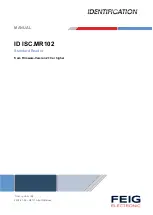
Pag. 131 di 152
It executes the program resident in C:\Programs\X3M and it transfers the 0101 file (load profiles)
from the instrument at address 27 to PC via the serial port Com1 38400 bps 8 data bits, no parity,
2 stop bits and it saves it to a file named (0101)Loadprofiles.html in HTML format.
11.1.1 Short commands
The operating parameters may be written in short format too by using one letter only followed directly by
the value with no = sign. The short commands table is given below.
--ip
-i
--ser
-s
--addr -a
--read -r
--write
-w
--del -d
--fnum -f
--xmbf -x
--txt -t
--html -h
--hex -H
--xls -l
--fname
-F
--create
-c
--xmodem
-X
--mascii
-A
--reboot
-R
--dpath
-p
--dfile
-f
11.2 Operation
type
These commands establish the operation that is required to be executed.
11.2.1
--read
Download
This command reads a file from the instrument flash disk by using the Modbus “read general file”
The file is read in the original binary format and saved, as is, into the working directory.
It is then converted to a destination file following the instructions of the Output Format.
If no other instructions are given, the file is converted to a TXT file and displayed on the computer screen.
This command does not change the content of the instrument flash disk.
11.2.2
--write
Upload
This command allows to write a file taken from the PC disk into the instrument flash disk. It must be used
only for uploading the configuration files of the various services or the calendar files.
The file name must contain, to its beginning, the number of the destination file and the name that will be
assigned to the report files generated by the service.
The upload file must be in xmbf (binary) format or in HEX format (in this case it will be automatically converted to
binary by the
--write
command).
The command may only overwrite existing file(s) of same size; it will be otherwise necessary to cancel it first in the
case of different size,
In the case of up load of a file not existing in the instrument, the
--create
command must be added to the command
line.
It may be used for firmware dates of the instrument by uploading the file number (FF01), after its cancellation. A
--
reboot
command or, alternatively, an instrument powering down and up again, are required in order to render
operative the new firmware.
















































